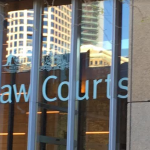Are There Situations Where a Person Who ‘Confesses’ Should Plead ‘Not Guilty’?

Tim Watkins was only 22 years old when he was left for dead by the side of Wilsons Creek Road earlier this year.
He was riding his bicycle home from a mates’ house shortly after midnight on a road he often travelled. At some point, he was hit by a passing motorist, who fled the scene. When Tim’s body was discovered about 9am the next morning, paramedics and police pronounced him dead at the scene.
It was an incident that shocked the small, tight-knit community of Mullumbimby, on the far north coast of New south Wales, where Tim lived. Police launched an investigation two days after the discovery of Tim’s body, searching for both the vehicle and the driver.
In the weeks that followed, local authorities, friends and family made various public pleas for information. Someone in the community was so incensed that they graffitied a sign on the road near where Tim’s body was found, with the words ‘Fess Up’.
Last month, Police released images of the type of vehicle they believed had hit Tim, but by all accounts, they were no closer to finding the actual vehicle or the driver, nor were they any closer to understanding exactly how the collision occurred.
Then, earlier his week, a 51-year old man turned himself in to Coffs Harbour Police. He was charged with numerous offences including: Dangerous driving occasioning death; negligent driving occasioning death and, Fail to stop and assist after a vehicle impact causing death.
These are all considered to be serious driving offences, each attracting maximum penalties of several years in prison.
What happens when you ‘turn yourself in’
By turning himself in, the driver may have helped his case in so far as if he pleads guilty, the surrender can be taken as significant evidence of genuine remorse and an indication that he is unlikely to reoffend, which are ‘mitigating factors’ in sentencing proceedings, and can contribute to the receipt of a more lenient penalty than he would otherwise have received.
The factors relevant to sentencing are contained in section 21A of the Crimes (Sentencing Procedure) Act 1999, which lists both ‘aggravating’ and ‘mitigating’ factors.
Under the law, an early plea of guilty entitles a defendant to a ‘utilitarian discount’ of 25% on the sentence he or she would otherwise have received, which can reduce the length of any prison sentence or even change the type of sentence received – for example, from time spent in prison to an intensive correction order, which can be served out in the community.
It is a ‘utilitarian’ discount because the plea of guilty saves court time and community funds.
What about a plea of ‘not guilty’?
However, the fact that a person surrenders to police and ‘confesses’ to illegal conduct does not necessarily mean they should plead guilty to the charges brought against them.
It should always be borne in mind that prosecution is required to prove each ‘element’ – or ingredient – of the offence beyond a reasonable doubt before a person can be found guilty of that offence.
This means that, in the event the prosecution lays charges which include elements that cannot be proved to the required standard, the defendant is entitled to an acquittal for that particular offence.
So, in practice, a person may believe they have done the wrong thing but – if the incorrect charges are pressed, or if charges which reflect conduct that is more serious than that engaged in by the defendant are laid, or if too many charges are brought – pleas of not guilty should be entered and the defendant, or their lawyer, should push for the inappropriate charges to be dropped or downgraded, or fight for them to be thrown out of court if the case proceeds to a defended hearing or a jury trial.
Going to court for a traffic offence?
If you are going to court for a traffic offence, call or email Sydney Criminal Lawyers anytime to arrange a free first consultation with an experienced, specialist traffic lawyer who will accurately advise you of your options, the best way forward, and fight for the optimal outcome in your specific situation.








